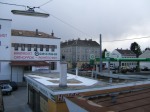intervention, Genochmarket, Vienna, 2008
white paint, roofing felt
»A commodity appears, at first sight, a very trivial thing, and easily understood. Its analysis shows that it is, in reality, a very queer thing, abounding in metaphysical subtleties and theological niceties.«[1]
In their work »Economy of Time« (2008) Tinzl/Flunger are playing with the two meanings of the german word: »WAREN«: It signifies the 1./3. person past tense of the verb »sein«/»to be« and the meaning of the plural of the substantive of the german word »Waren«/»commodities«. As a white-coulored writing one can find the letters of this word spread on the roofs of five pavillons that belong to a disused market on the outskirts of Vienna. The writings remain hidden for the visitors as long as they don’t climb the roof from where they are able to overlook the abandoned market from a bird’s eye view.
Like a vanitas-motto of capitalist production relations the word is there – at the same time a banal reference to the content of the market.
The exchange value, unlike the value in use, which characterises the commodity according to Marx, conceals the factors of production lying underneath it. That goes along with economisation of working hours, the economy of time. As a matter of fact that does not lead to a benefit in leisure time, as you would assume, but to an increase in production that is requested by competition. The stylisation of those factors – constitutional for or caused by the winners of the process -, is the well-established mystification of the structure of the market. A mystification, that can be found in the title of the work of Tinzl/Flunger, plainly suggesting – what is known all over already - that namely the »Economy of Time« for the majority means to drop out of competition – just like for the little market on the outskirts of the town. After all this comes as a logical consequence of the current social conditions.
[1] Karl Marx, Golo Mann, Ernst Bloch, Karl Marx, 1818-1968, veröffentlicht 1968, Inter Nationes, 250 Seiten, Original von University of Michigan, digitalisiert am 11. Dez. 2006, S. 184
Text: Katharina Rettelbach, 2008







